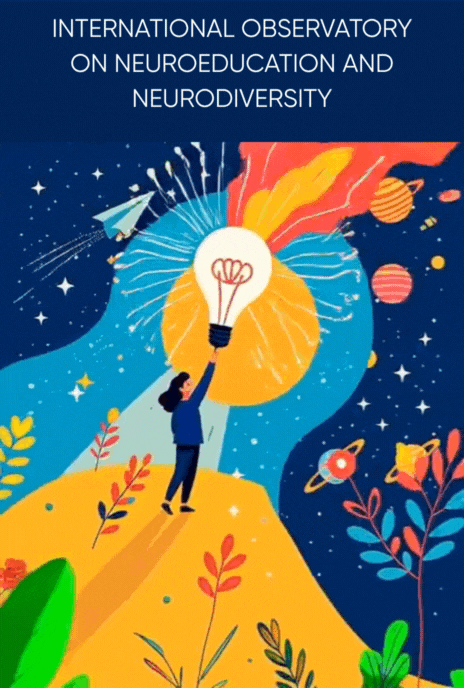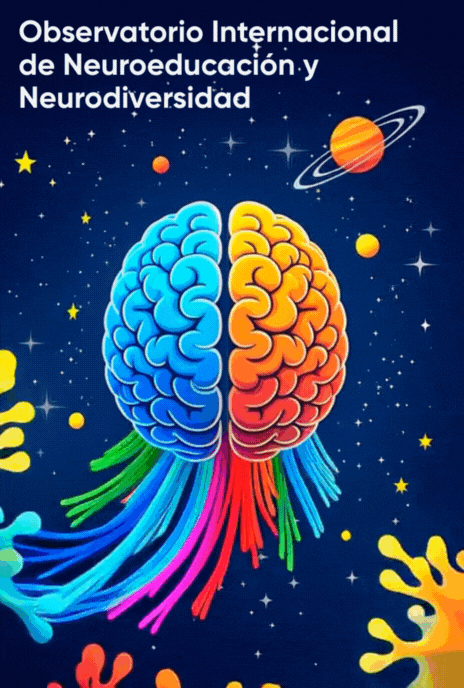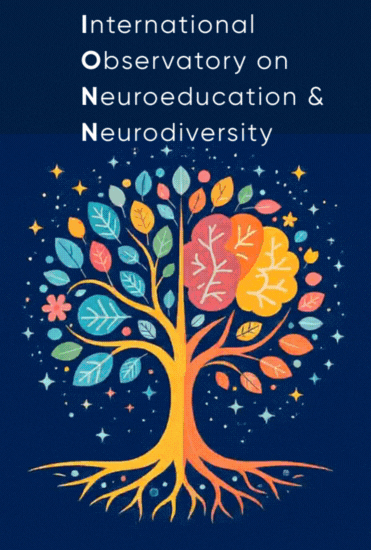Please consult the guidelines that govern our community here
At the International Observatory of Neuroeducation and Neurodiversity, we operate under the principles of respect, transparency, and collaboration. Our Bylaws and Code of Ethics serve as the foundation that guarantees a safe, inclusive, and committed environment for neurocognitive diversity.


Internal Regulations
Chapter I. General Provisions
Article 1. Nature
The International Observatory of Neuroeducation and Neurodiversity (hereinafter referred to as “the Observatory”) is an academic, scientific, and social organization whose purpose is to promote the study, dissemination, training, and support in areas related to neuroeducation and neurodiversity.
Article 2. Objectives
The principal objectives of the Observatory are to: a) Foster research and the exchange of knowledge in neuroeducation and neurodivergences. b) Create spaces for dialogue and collaboration among researchers, educators, students, families, schools, institutions, and patients. c) Drive initiatives for training, awareness, and scientific and social outreach. d) Build inclusive support networks that are respectful of neurocognitive diversity.
Article 3. Governing Principles
The Observatory shall be governed by the principles of:
Inclusion
Respect for diversity
Academic and professional ethics
Collaboration
Transparency
Social responsibility
Chapter II. Membership
Article 4. Categories of Admission
Individuals and institutions may become part of the Observatory by submitting the corresponding application form and meeting the established requirements.
Article 5. Nature of Membership
The International Observatory of Neuroeducation and Neurodiversity recognizes diverse membership qualities with the purpose of integrating professionals, institutions, students, and individuals with direct experiences related to neurodiversity, who are committed to research, innovation, and the promotion of inclusive education.
Article 6. Membership Categories
The membership categories in the Observatory are as follows:
I. Founding Members: Individuals or legal entities that participated in the initial creation and development of the Observatory, establishing its organizational, mission-based, and strategic foundations. This status is lifelong and constitutes recognition of their contribution to the project’s genesis. The period for being considered a Founding Member shall be from September 1 to December 31, 2025.
II. Full Members: Individuals with a consolidated track record in research, teaching, or professional practice in the fields of neuroeducation, neurosciences, or inclusive education.
III. Advisory Board Members: Experts of recognized academic, scientific, or institutional authority, appointed to advise on the definition of strategic guidelines, impact evaluation, and the Observatory’s priorities. They will receive the title of 'Distinguished' starting from the Doctoral degree or if they make transcendental contributions to the work of the Observatory by majority decision of the other Council members.
IV. Honorary Members or Academic Ambassadors: Distinguished individuals recognized for their significant contribution to the academic, scientific, or social sphere, whose recognition is sought to strengthen the Observatory's prestige and visibility.
V. Corresponding Members: Professionals or researchers residing abroad, or those who collaborate remotely, who contribute knowledge, experience, or contact networks for the Observatory's international projection.
VI. Associate or Junior Members: Postgraduate students, recent graduates, or professionals in training who are interested in gaining experience, participating in research activities, training, or dissemination.
VII. Institutional Members: Universities, research centers, civil associations, public or private organizations that formalize their affiliation with the Observatory to establish academic, scientific, and/or technical collaboration links.
VIII. Parent Members: Mothers, fathers, or guardians who wish to actively participate in the Observatory, contributing their experience, vision, and commitment to supporting neurodivergent students and building inclusive education.
IX. Neurodivergent Experience Members: Individuals who identify with a neurodivergent condition and who, from their personal experience, enrich the Observatory’s perspectives by sharing their experiences, proposals, and recommendations for building a more inclusive and diverse educational community.
Additionally, the Governing Board may freely modify the categories established herein or establish new categories at any time, based on the Observatory’s needs and projects.
Article 7. Member Rights
All members, in their various categories, shall have the right to: a) Participate in the Observatory’s academic, research, and outreach activities in accordance with their membership status. b) Receive periodic information about the Observatory’s projects, forums, and publications. c) Propose initiatives, suggestions, or projects that enrich the Observatory’s work. d) Request certificates of participation or membership. e) Make use of the benefits that the Observatory establishes in their favor.
Founding Members, Full Members, and Advisory Board Members shall also enjoy the rights to:
Vote in the Observatory's assemblies.
Nominate themselves for representative positions or commission coordination roles.
Article 8. Member Obligations
All members of the Observatory must: a) Respect and observe the Statutes and Internal Regulations. b) Actively contribute to the academic, research, and outreach activities to the best of their abilities. c) Promote the principles of inclusion, respect for diversity, and scientific commitment that inspire the Observatory. d) Keep their contact information up-to-date through the official form. e) Promote the prestige and institutional image of the Observatory.
Article 9. Recognition and Dissemination
With the express written authorization of the respective member, the Observatory may publish the name, academic degree, or institutional affiliation of its members, especially those holding the status of Founding Members, Full Members, Advisory Board, Honorary Members, Parent Members, or Neurodivergent Experience Members, on its website and institutional materials. This is done to recognize their contribution and give visibility to their trajectory.
Article 10. Loss of Membership Status
Membership status, in any of its categories, may be terminated due to: a) Voluntary resignation submitted in writing. b) Repeated failure to comply with the obligations established in these Regulations. c) Conduct contrary to the principles and aims of the Observatory. d) Decision of the Governing Board, based on the provisions in the Statutes.
Chapter III. Internal Organization
Article 11. Coordinating Bodies
The Observatory shall have the following bodies:
a) Governing Board (Consejo Directivo): The highest decision-making body, composed of representatives from each membership category. b) Advisory Council (Consejo Consultivo): A space for advice, strategic support, and networking. Its main function is to provide external expertise, generate networks, and guide decisions, not to manage operations. c) General Coordination (Coordinación General): Responsible for operational and administrative management. d) Thematic Committees (Comités Temáticos): Specialized teams for research, training, outreach, family support, and patient networks. e) Editorial Committee (Comité Editorial): Responsible for the analysis, review, approval, and publication of all editorial material proposed for publication by the Observatory members. f) General Assembly (Asamblea General): A participatory forum for all members, convened at least once a year.
Article 12. Decision-Making
Decisions shall be adopted by a simple majority in the corresponding bodies. In case of a tie, the General Coordination’s vote shall prevail.
Chapter IV. Participation Regime
Article 13. Admission of New Members
Admission shall be voluntary and formalized through an application via the membership form, with validation by the General Coordination.
Article 14. Permanence
Continued membership in the Observatory shall be subject to the fulfillment of the obligations described in these regulations.
Article 15. Loss of Membership Status
Membership status may be lost due to: a) Voluntary resignation. b) Repeated failure to comply with obligations. c) Discriminatory, violent conduct, or conduct contrary to the governing principles.
Chapter V. Institutional Collaboration
Article 16. Institutional Partnerships
The International Observatory of Neuroeducation and Neurodiversity may establish cooperation links with government entities, educational institutions, businesses, civil society organizations, and international bodies that share the Observatory’s principles and objectives.
Article 17. Collaboration Objectives
Collaborations with external institutions shall have the following main aims: a) Promote research and innovation in neuroeducation and neurodivergences. b) Strengthen training, capacity-building, and awareness programs aimed at educators, families, patients, and the general community. c) Drive inclusive, evidence-based public policies. d) Disseminate educational and social best practices. e) Generate support networks that favor inclusion and equity.
Article 18. Collaboration Modalities
Alliances may be established through:
Formal collaboration agreements.
Joint participation in research or outreach projects.
Organization of seminars, congresses, workshops, or training activities.
Co-authored publication and dissemination of materials.
Corporate social responsibility programs linked to neuroeducation and neurodiversity.
Article 19. Collaboration Principles
All institutional collaborations must:
Respect the Observatory’s governing principles (inclusion, ethics, transparency, and social responsibility).
Avoid conflicts of interest and ensure that agreements are mutually beneficial.
Maintain the Observatory’s academic and scientific independence.
Guarantee transparency in the use of resources and the dissemination of results.
Article 20. Authorization of Collaborations
Collaborations with external institutions must be evaluated and approved by the Governing Board. The General Coordination shall be responsible for the management and follow-up of the established agreements.
Chapter VI. Member Publications
Article 21. Right to Publish
All Observatory members shall have the possibility to propose publications in the Observatory's official spaces (journals, newsletters, reports, digital repositories, and other dissemination media), provided they comply with the established guidelines.
Article 22. Types of Publications
Publications may include: a) Scientific or outreach articles. b) Research reports or case studies. c) Educational materials, guides, or pedagogical resources. d) Testimonials, personal narratives, or life experiences (with express author authorization and ensuring confidentiality). e) Essays, policy analyses, or intervention proposals.
Article 23. Formal Requirements
All publications must adhere to the Observatory's ethical and inclusion principles.
Works must be written in respectful language free of stigmatization.
Proper acknowledgment of authorship and relevant bibliographic references shall be required, avoiding any practice of plagiarism.
Texts must conform to the style, format, and length guidelines defined by the Editorial Committee.
Article 24. Review and Approval
Publication proposals shall be reviewed by the Editorial Committee, composed of representatives from the different membership categories.
The Committee shall evaluate the relevance, quality, and originality of the texts.
Publications may be accepted, accepted with modifications, or rejected, according to the Committee’s judgment.
Article 25. Publication Rights
Authors shall retain intellectual property of their works.
The Observatory shall have the right to disseminate and archive the publications in its official media, always acknowledging authorship.
A recovery fee (to cover editing, technical review, and dissemination costs) may be established by the Governing Board, and this shall be communicated to the authors beforehand.
Article 26. Content Responsibility
Authors shall be responsible for the content of their publications. The Observatory shall not be held responsible for individual opinions, although it commits to ensuring that texts comply with the principles of respect, inclusion, and academic rigor.
Article 27. Withdrawal of Publications
The Observatory may withdraw publications from its official spaces if plagiarism, data falsification, discriminatory language, or other breaches of these regulations or the Code of Ethics are detected.
Chapter VII. Economic Regime
Article 28. Non-Profit Nature
The International Observatory of Neuroeducation and Neurodiversity is a non-profit organization. All resources obtained shall be exclusively allocated to the sustenance of its academic, outreach, and community support activities.
Article 29. Membership Fee
Integration into the Observatory shall be free of charge for Founding Members. Non-Founding Members shall cover an annual fee, which will be due on the annual anniversary of their affiliation. The amount of the annual fee shall be reviewed and updated annually by the Governing Board in accordance with the Institution's needs.
Article 30. Voluntary Contributions
The Observatory may receive voluntary contributions from its members or third parties interested in supporting its work. Such contributions shall not be a condition for participating in the Observatory’s activities nor shall they grant privileges in decision-making.
Article 31. Publication Fees
Members who wish to publish articles, reports, studies, or materials in the Observatory’s repositories, newsletters, or digital spaces must cover a recovery fee intended for editing, technical review, and dissemination expenses. The amount shall be defined and updated by the Governing Board.
Article 32. Financial Transparency
The General Coordination shall present an annual report on the use of resources, which shall be available to all members, ensuring transparency in the Observatory's financial administration.
Chapter VIII. Advisory Council
Article 33. Nature and Purpose
The Advisory Council is an honorary and non-binding body of the organization, composed of individuals with recognized prestige, experience, and trajectory in areas related to the Institution's aims. Its main function is to advise, guide, and enrich the organization's strategic decisions and projects with their knowledge and collaboration networks.
Article 34. Functions
The functions of the Advisory Council are:
Advising on the design of the organization's strategies, programs, and projects.
Providing specialized knowledge in the fields linked to the institutional mission.
Facilitating links with relevant bodies, institutions, and stakeholders for the benefit of the organization.
Issuing non-binding recommendations and opinions on relevant matters presented to it by the Directorate or the corresponding governing body.
Contributing to the organization's visibility, prestige, and social legitimacy.
Participating in institutional events, publications, and activities when desired or invited.
Article 35. Composition
The Advisory Council shall be composed of a minimum of six (6) and a maximum of twenty (20) members.
Members shall be selected by the Selection Committee upon proposal from the General Directorate or the advisory council members themselves.
Participation shall be honorary, without economic remuneration, except for the reimbursement of previously authorized expenses.
Article 36. Requirements and Characteristics of Members
Individuals who meet the following criteria may be part of the Advisory Council:
Possess recognized experience in the fields of education, neuroscience, neurodiversity, social management, or areas related to the organization's aims.
Enjoy ethical and professional prestige.
Share the institutional mission, vision, and values.
Commit to dedicating a reasonable amount of time to the Council's sessions and activities.
Article 37. Admission Procedure
Admission shall be through a formal invitation issued by the Governing Board and accepted by the invited person.
Public calls made at any time by the Governing Board based on the Institution's needs.
Each designation must be recorded in the minutes and publicly communicated through the organization's official channels.
Article 38. Term
Advisory Council members shall serve for a term of two (2) years, and may be renewed for additional terms.
Membership may conclude earlier due to: resignation, self-decision, decision of the governing body, or loss of the requirements established in these regulations.
Article 39. Organization and Operation
The Advisory Council shall meet at least twice (2) a year, either in person or virtually.
It may elect an Honorary Coordinator or President from among its members, whose function will be to organize the sessions and represent the Council in institutional acts.
Opinions and recommendations shall be recorded in minutes and submitted to the General Directorate and the Governing Board.
Article 40. Relationship with the Directorate and the Administrative Structure
The Advisory Council is not part of the organization’s administrative or governing structure.
The General Directorate shall participate in the Council's sessions as a permanent invitee, with voice but without a vote.
The Advisory Council has no executive or direct supervisory powers over the organization's staff, programs, or resources.
Chapter IX. National Sections
Article 41. Nature of National Sections
The International Observatory of Neuroeducation and Neurodiversity may establish National Sections in any country to strengthen its international presence and promote the adaptation of its objectives to local contexts.
Article 42. Constitution of National Sections
National Sections shall be constituted by agreement of the Governing Board, at the request of a group of members from the interested country or by initiative of the General Coordination itself. Each National Section shall be officially recognized once validated by the Governing Board.
Article 43. Representation
Each National Section shall have a National Representative, appointed by the Governing Board from a shortlist of three proposed by the active members of that Section. The Representative shall be the formal link between the Section and the General Coordination of the Observatory.
Article 44. Term of Office
The National Representative shall serve for an indefinite term, unless the Governing Board determines their replacement due to justified cause, resignation, or a request from a simple majority of the National Section's active members.
Article 45. Functions of the National Representative
The functions of the National Representative are to: a) Coordinate and promote the Observatory's activities at the national level. b) Officially represent the Observatory before local institutions and stakeholders. c) Facilitate the linkage between the National Section and the Observatory's coordinating bodies. d) Ensure that national activities are conducted in accordance with the Observatory’s governing principles and general guidelines. e) Periodically inform the Governing Board about the status and progress of the National Section.
Article 46. Organization of National Sections
Each National Section may organize committees, working groups, or local coordinations, always in line with the structure and principles established by the Observatory. These internal bodies shall not have legal personality independent of the Observatory.
Article 47. Relative Autonomy
National Sections shall enjoy relative autonomy to design activities, projects, and collaborations in their country, provided they respect the governing principles and guidelines approved by the Governing Board.
Article 48. Dissolution of National Sections
The Governing Board may agree to the dissolution of a National Section when: a) The Observatory's governing principles or guidelines are repeatedly violated. b) Conduct contrary to ethics, inclusion, or transparency is detected. c) Prolonged inactivity without reasonable justification occurs. d) It is requested by the majority of the Section's own members.
Chapter X. Final Provisions
Article 49. Amendments to the Regulations
These regulations may be amended by agreement of the Governing Board and ratification of the General Assembly.
Article 50. Interpretation
The interpretation of these regulations shall correspond to the Governing Board, based on the Observatory's governing principles.
Article 51. Effectiveness
These regulations shall come into effect upon their approval by the Observatory's Governing Board.
Version approved on November 1, 2025
Code of Ethics
Preamble
The International Observatory of Neuroeducation and Neurodiversity, committed to inclusion, respect for diversity, and the promotion of neuroeducation, hereby establishes this Code of Ethics as a framework for the conduct of its members. This document seeks to ensure a safe, collaborative, and respectful environment for researchers, educators, students, parents, institutions, companies and organizations from all fields, and patients with neurodivergences.
Fundamental Principles
1. Inclusion and Diversity All members are committed to fostering an inclusive environment where neurocognitive, cultural, social, and academic diversity is recognized, respected, and valued.
2. Mutual Respect Interactions among members must be based on respect, avoiding any form of discrimination, violence, harassment, or derogatory treatment.
3. Equity and Collaboration The Observatory is founded on collaborative work. Each member will contribute to the best of their ability, ensuring equity in participation.
4. Transparency and Honesty All academic, research, or outreach activities must be conducted with adherence to truth, scientific ethics, and transparency in the use of information.
5. Confidentiality Sensitive information shared within the Observatory, especially that related to personal experiences of neurodivergence, must be treated with the strictest confidentiality.
Standards of Conduct
Article 1. Relations Among Members Members must maintain a courteous, inclusive, and respectful demeanor in all Observatory spaces, whether in-person or virtual.
Article 2. Responsible Use of Information It is prohibited to disclose the Observatory’s internal information without express authorization, as well as to manipulate or distort data for personal benefit.
Article 3. Ethical Participation in Activities Those participating in research, workshops, forums, or support groups must:
Respect diverse opinions.
Acknowledge the intellectual authorship of others' contributions.
Avoid plagiarism or the improper appropriation of ideas.
Article 4. Conflicts of Interest Members must declare any situation that may create a conflict of interest and abstain from participating in decisions where their objectivity might be compromised.
Article 5. Conduct Toward Patients and Families Researchers, educators, and other members must treat patients with neurodivergences and their families with sensitivity and respect, ensuring non-stigmatization and the promotion of human dignity.
Article 6. Conduct Toward the External Community Members represent the Observatory in all interactions with third parties and must conduct themselves with professionalism, respect, and ethical commitment.
Compliance Mechanisms
Article 7. Ethics Committee An Ethics Committee will be established within the Observatory, composed of representatives from different categories of members, responsible for: a) Disseminating and promoting the Code of Ethics. b) Addressing complaints and reports related to its non-compliance. c) Issuing recommendations and corrective measures.
Article 8. Sanctions Non-compliance with this Code may result in: a) Verbal or written warning (admonition). b) Temporary suspension from activities. c) Termination of membership, in severe or repeated cases.
Final Provisions
Article 9. Code Review This Code of Ethics may be reviewed and updated every two years, or sooner, should the Observatory's needs so require.
Article 10. Adherence All members, upon joining the Observatory, express their agreement with this Code of Ethics and commit to abide by its provisions.
Version approved on September 1, 2025
We monitor, research, and disseminate knowledge to transform education."
The Observatory serves as a hub for analysis and a key reference point that:
Monitors scientific advancements in neuroeducation and neurodivergence.
Generates data and evidence to inform educational policies and practices.
Promotes the inclusion and well-being of students with diverse learning styles.
Connects the educational community with up-to-date research and resources.


Actualidad
info@observaneuro.com
The International Observatory of Neuroeducation and Neurodiversity® its logo, and slogans constitute industrial property and are either registered or may be in the process of registration with the relevant authorities. Therefore, any unauthorized reproduction thereof by any means is strictly prohibited.
© International Observatory of Neuroeducation and Neurodiversity 2025. All rights reserved.


Privacy Policy
